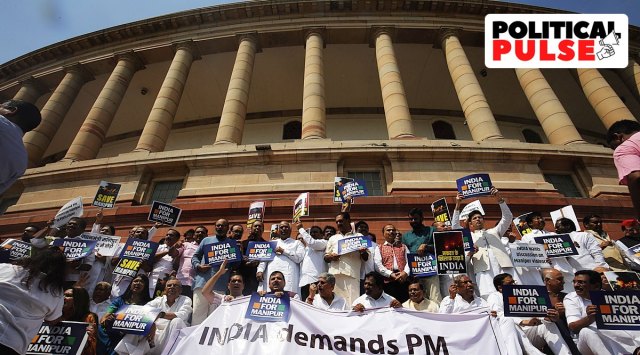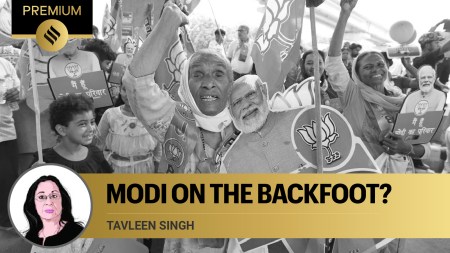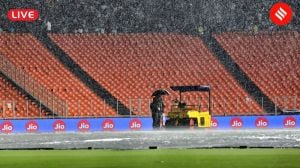- India
- International
Monsoon Session: Among highest in Bills passed, among lowest in productive hours in 17th LS
14 Bills passed in 22 hours of discussions, with five hours accounted for just contentious Delhi services Bill. Some Bills were passed after just minutes of debate
 Despite working for less than half its scheduled time, this Monsoon Session still managed to pass 22 of the 25 Bills tabled. (Express photo by Anil Sharma)
Despite working for less than half its scheduled time, this Monsoon Session still managed to pass 22 of the 25 Bills tabled. (Express photo by Anil Sharma) On Friday, the tumultuous Monsoon Session of Parliament ended, after seeing the passage of controversial Bills such as the one on Delhi services and data protection, a no-confidence motion against the NDA government, and the introduction of Bills set to make sweeping changes to the criminal and penal codes. Though the Session turned out to be one of the least productive of the 17th Lok Sabha, what is telling is that still 22 bills were passed, including 10 with less than an hour of discussion on each.
Here’s how the Monsoon Session stacks up against previous Parliament Sessions:
Lok Sabha worked less than half its scheduled time
Since the beginning of the 17th Lok Sabha in 2019, productivity has been gradually declining. Both Houses of Parliament have worked for well below the planned hours, barring a handful of Sessions earlier in this term. But even among the Sessions since 2019, the just-ended Monsoon Session was among the least productive, working for only 43% of its scheduled time. Only the 2021 Monsoon Session and 2023 Budget Session worked for lesser hours. The Rajya Sabha was slightly more productive than the Lok Sabha this Session, but still managed only 55% of its scheduled hours.
 % the Lok Sabha and Rajya Sabha functioned of the actual working hours
% the Lok Sabha and Rajya Sabha functioned of the actual working hours
Only two other Sessions of the 17th Lok Sabha passed more Bills
Despite working for less than half its scheduled time, this Monsoon Session still managed to pass 22 of the 25 Bills tabled. The Lower House passed more Bills only in two other Sessions since 2019 – 35 in the 2019 Budget Session and 25 in the 2020 Monsoon Session.
The Rajya Sabha this time passed 25 bills, the second highest in the Upper House after 29 Bills were passed in the first Session of this Parliament. The Upper House sees fewer Bills introduced than the Lower House in general, and the highest so far has been seven Bills in the 2019 Budget Session.

 No. of Bills introduced and passed in the Lok Sabha
No. of Bills introduced and passed in the Lok Sabha
 No. of Bills introduced and passed in the Rajya Sabha
No. of Bills introduced and passed in the Rajya Sabha
Some Bills passed after only minutes of discussion
Though the Lok Sabha passed 22 Bills, including the contentious Delhi services Bill, it spent just over 14 hours of its total functioning time of 43 hours on discussing the legislation.
Barring the Government of National Capital Territory of Delhi (Amendment) Bill, 2023, and the Anusandhan National Research Foundation Bill, 2023, every other Bill was passed after less than an hour of discussion. On average, each cleared Bill was discussed for only 40 minutes.
Two Bills on the Goods and Services Tax were passed after only two minutes of discussion on each, and Bills on the national nursing and dental commissions were passed after three minutes of discussion each. The Delhi services Bill saw the longest discussion, at 4 hours and 54 minutes, accounting for a third of the total discussions during this Session.
The Monsoon Session also saw the Rajya Sabha, where the government majority is much thinner, discuss Bills for more than twice as long as the Lok Sabha did. It’s only the third time in this government’s term that the Rajya Sabha has held longer discussions than the Lok Sabha. Notably, the Delhi services Bill was discussed for more than eight hours in the Upper House. Only 10 of the 25 Bills passed in the Upper House were discussed for less than an hour before their passage.
 Hours spent discussing and passing Bills in the Lok Sabha and Rajya Sabha
Hours spent discussing and passing Bills in the Lok Sabha and Rajya Sabha
Alarming trend in Lok Sabha productivity
Since 2019, Parliament has seen a consistent decline in productivity. The Lok Sabha worked overtime in four of its first five Sessions but has since failed to work for 100% of its allotted hours every session, except for the 2022 Budget Session. Even the number of Bills introduced and passed have generally declined since 2019, with this year’s Monsoon Session bucking the trend.
With the Lok Sabha spending increasingly less time working, it appears MPs are spending even less time discussing Bills before these are passed. Against almost 124 hours discussing legislation before voting on them in its first Session in 2019, the 17th Lok Sabha has spent an average of 22 hours across all sessions discussing Bills. This Monsoon Session stands out because the Lok Sabha rushed 22 Bills through after just over 14 hours of discussion. But legislative discussions have been shorter in the past, falling to a low of under 30 minutes in the 2023 Budget Session.
Another recent trend in the current Lok Sabha is the increasing loss of time to interruptions. From the first Session of the 17th Lok Sabha to the Budget Session earlier this year, the House has lost 293 hours to disruptions, peaking at 96 hours during the 2023 Budget Session. Though Parliament often schedules overtime when necessary, the 17th Lok Sabha has also spent increasingly less time in late Sessions to make up for lost hours.
Disruptions are a much larger problem in the Rajya Sabha. In the 11 Sessions preceding this Monsoon Session, the House lost a total 373 hours to interruptions, with the 2023 Budget Session accounting for more than a quarter of these lost hours.
 Hours lost to interruptions in the Lok Sabha and Rajya Sabha
Hours lost to interruptions in the Lok Sabha and Rajya Sabha
May 13: Latest News
- 01
- 02
- 03
- 04
- 05






































